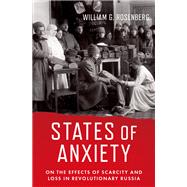Amidst the vast literature on the parties and politics of revolutionary Russia and its near constant appropriation for presentist purposes over the years, States of Anxiety assesses the effects of the great scarcities and enormous losses that Russia experienced between 1914 and 1921, a period of dramatic civil conflicts and Russia's “long World War.” Scarcities meant not only the deficits of necessary goods like food, but also their accompanying anxieties and fears. Using archival documents and materials of the period almost exclusively, this study explores how the tsarist, democratic liberal, democratic socialist, and Bolshevik regimes all addressed the forms and effects of scarcity and loss in ways they hoped would assure the revolutionary outcomes of their own historical imaginations. Looking closely at their efforts, it suggests how and why each failed to do so.
Approaching the Russian revolutionary period in these terms involves exploring a broad range of connected issues. Material scarcities involved problems with market exchange, prices, and inflation, as well as procurement, production, and distribution. They involved fiscal policies, monetary emissions, and the effects of escalating debt. But they also directly engaged cultural understandings of fairness, sacrifice, and social difference, and were accompanied by what today would be called today the anxieties of “food insecurity,” the dangerous risks of unemployment, and a range of fears about family and community welfare. Officials and members of various state and public committees of various political orientations faced both the threats and actualities of market collapse, rampant speculation, black markets, increasingly visible social inequalities, and an array of emotional fields whose implications need to be understood.
The statistical and other objective dimensions of scarcity and loss are generally described in ways that omit their complex emotional dimension, as the language of “food insecurity” obscures the actual effects of hunger. While taking into account important recent contributions to a large historiography, new efforts to decipher historical feelings and emotions, and attention to the languages through which events and feelings both were represented and given coherence, this book contributes to a broader understanding of the social and cultural foundations of uprisings and revolutionary upheavals.








